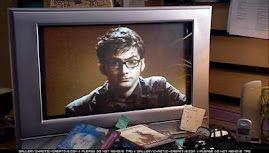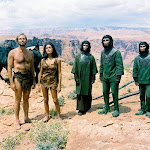More from the delightful Charlie Brooker ...
Contemplating the scale of the universe makes a mockery of household chores
News that the galaxy Andromeda is eating stars makes it hard to care about putting out the rubbish.
The sheer breadth of human knowledge is a wonderful thing. But sometimes it's scary. This morning I was aimlessly clicking my way around the BBC news site – which has become one of my favourite things in the world since I discovered just how much its very existence annoys James Murdoch – reading about the burial of Michael Jackson and the like, when my eye was drawn to an alarming headline.
"Galaxy's 'cannibalism' revealed," it read (http://news.bbc.co.uk/2/hi/science/nature/8234898.stm). This led to a story in the science section which calmly explained that a group of astronomers has decided that the Andromeda galaxy is expanding by "eating" stars from neighbouring galaxies. Having studied Andromeda's outskirts in great detail, they discovered the fringes contained "remnants of dwarf galaxies".
It took me a couple of reads to establish that Andromeda wasn't literally chewing its way through the universe like a giant intergalactic Pac-Man, and that the "remnants of dwarf galaxies" were living stars, not the immense galactic stools I'd envisaged. That was what had really frightened me: the notion that our entire solar system might be nothing more than a chunk of undigested sweetcorn in some turgid celestial bowel movement; that maybe black holes are actually almighty cosmological sphincters, squeezing solid waste into our dimension. What if the entire universe as we know it is essentially one big festival toilet?
That'd be a pretty good social leveller, come to think of it. So there, James Murdoch. You might well walk around thinking, "Ooh, hooray for me, I'm the chairman and CEO of News Corporation Europe and Asia, not to mention chairman of SKY Italia and STAR TV, the non- executive chairman of British Sky Broadcasting, and a non-executive director of GlaxoSmith-Kline", but at the end of the day you're just one of 900 trillion insignificant molecules in an all-encompassing turdiverse. And your glasses are rubbish.
Anyway, the astronomers who made the discovery about Andromeda deserve our awe and respect, because their everyday job consists of dealing with concepts so intense and overwhelming that it's a wonder their skulls don't implode through sheer vertigo. Generally speaking, it's best not to contemplate the full scope of the universe on a day-to-day basis because it makes a mockery of basic chores. It's Tuesday night and the rubbish van comes first thing Wednesday morning, so you really ought to put the bin bags out, but hey – if our sun were the size of a grain of sand, the stars in our galaxy would fill an Olympic-sized swimming pool, and if our entire galaxy were a grain of sand, the galaxies in our universe would fill several Olympic-sized swimming pools. You and your bin bags. Pfff!
The human brain isn't equipped to house thoughts of this humbling enormity. Whenever I read a science article that nonchalantly describes the big bang, or some similarly dizzying reference to the staggering size and age and unknowable magnitude of everything, I feel like a sprite in an outdated platform game desperately straining to comprehend the machine code that put me there, even though that isn't my job: my job is to jump between two moving clouds and land feet-first on a mushroom without ever questioning why.
Perhaps astrophysics stories should come with a little warning. Just as graphically violent news reports tend to be preceded by a quick disclaimer advising squeamish viewers that the following footage contains shots of protesters hurling their own severed kneecaps at riot police – or whatever – maybe brain-mangling science reports likely to leave you nursing an unpleasant existential bruise for several hours should be flagged as equally hazardous. How can I flip channels and enjoy Midsomer Murders once I've been reminded of the crushing futility of everything? I can't even get worked up about the murders in that kind of mood. Yeah, kill him. And her. And them. Sod it. It's all just atoms in an unfathomable vortex.
Not that the few scientists I know seem to suffer. In fact, they're unrelentingly calm and upbeat, like they've stumbled across a cosmic secret but aren't telling. One of my friends is married to a quantum physicist who, sickeningly, manages to combine an immense brain with a relaxed, down-to-earth, amused attitude to everything. He once tried to explain the characteristics of different theoretical dimensions to me.
Dimensions one to four I could just about cope with. The fifth made vague sense at a push. But the rest collapsed into terrifying babble. There was no foothold. I swear, at one point he casually claimed the seventh dimension measured about half a metre in diameter and was shaped like a doughnut. That can't be right: either I've misremembered it because my brain deleted the explanation as it was going in, chewing it up and spitting it out before it could do damage, or – and this is just a wild theory – I'm too stupid to understand much in the realm of science beyond the difference between up and down, and the seventh dimension is beyond me. It might've been part of string theory (I like string theory, because I can at least hazily picture the strings). But this seventh dimension stuff was just gibberish.
God knows what the eighth dimension consists of. Probably two chalk moths and a puddle. Whatever it is, and wherever it lives, don't tell me. The dustcart's due and I don't want to know.
Link: http://www.guardian.co.uk/commentisfree/2009/sep/07/charlie-brooker






